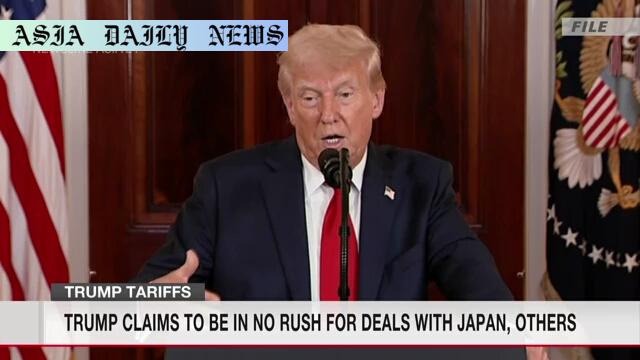Trade deal discussions remain ongoing as Trump strategically delays agreements with Japan, South Korea, and India.
Trump strategically delays trade deal agreements with Japan, South Korea, and India.
US aims to reduce trade deficits with Japan, impacting ongoing negotiations.
Trump’s aloof stance is a tactic aimed at securing better trade deals.

Trump’s Strategic Approach to Trade Deals
US President Donald Trump has suggested that he is in no rush to finalize trade deals with Japan, South Korea, and India. His approach aims to leverage his position for better agreements. By appearing aloof, Trump underscores a strategic standpoint, emphasizing that the United States holds the upper hand in these negotiations. This calculated delay may allow Washington to achieve more favorable terms and address the president’s long-standing concerns over trade deficits, particularly with Japan.
The Focus on Trade Deficits
Reducing trade deficits has been a consistent priority for the Trump administration. Reports suggest that Washington expects Tokyo to propose concrete measures aimed at addressing the existing imbalance between imports and exports. The dynamics between the United States and Japan hinge on these trade figures, as the administration considers economic fairness a cornerstone of its policies. Trump’s measured response to negotiations reflects confidence in reversing these deficits by ensuring comprehensive and mutually beneficial agreements.
Implications for Japan, South Korea, and India
Japan, South Korea, and India are notable trade partners for the United States. However, Trump’s rhetoric signals that these nations may need to make concessions. Japan, in particular, may face more substantial changes, with sources confirming Washington’s emphasis on actionable trade deficit solutions. South Korea and India, while strategic partners, also face similar pressures to align their economic commitments with US expectations. These developments could reshape the trading landscape significantly.
A Broader Global Context
The president’s stance on global trade deals aligns with his “America First” philosophy. By delaying agreements and seeking improved terms, the United States reinforces its priorities on economic strength and diplomatic leverage. However, this approach may inspire other nations to reconsider their trade relationships with Washington. As the administration focuses on achieving incremental benefits, the broader implications of Trump’s tactics will likely resonate across future negotiations worldwide.
The Political Implications of Trade Strategy
Trump’s delayed approach also carries political implications. By emphasizing the United States’ economic dominance, the administration appeals to domestic constituencies that view trade reform as critical to national interests. This calculated maneuver can bolster support among voters looking for tangible economic victories, particularly those in manufacturing or industries affected by trade imbalances. These tactics fit neatly within the Trump administration’s broader economic messaging—a combination of resilience and strategic patience.
Concluding Thoughts
President Trump’s decision to stall trade agreements with Japan, South Korea, and India underlines a meticulous and strategic approach to global economic diplomacy. By maintaining a stance of confidence and composure, the United States projects dominance and aims to extract more favorable terms. While the process is complex and filled with uncertainties, the long-term outcomes of these negotiations can define a new era in US trade policy. Nonetheless, the approach also poses risks, particularly if partners decide to shift alliances while awaiting resolutions.
Commentary
Analyzing Trump’s Trade Negotiation Tactics
President Donald Trump’s decision to delay trade agreements with Japan, South Korea, and India is a significant departure from traditional trade diplomacy. Instead of pushing for swift deals, Trump’s stance appears focused on maximizing US leverage, a tactic that showcases his confidence in America’s economic strength. While this approach has its merits, it also raises questions about potential ripple effects in a global economy that relies on interconnected trade relationships.
Strategy or Stalemate?
On the one hand, Trump’s approach can be seen as a pragmatic strategy designed to extract more concessions from trading partners. By making it clear that the United States does not desperately need these deals, he creates a power dynamic where other nations may feel compelled to offer more favorable terms. This aligns with Trump’s broader “America First” philosophy, which prioritizes reducing trade deficits and ensuring a level playing field in global markets. However, prolonged delays could risk souring relationships with key allies, pushing them to explore alternative partnerships, potentially even with US competitors.
Economic Impacts of Delayed Agreements
While Trump’s tactics may yield long-term benefits, the immediate economic implications cannot be ignored. Trade delays may disrupt industries dependent on smooth international commerce, potentially impacting sectors such as agriculture, manufacturing, and technology. Furthermore, trading partners like Japan and South Korea may view these tactics as a lack of commitment, which could strain diplomatic ties. The balance between bold negotiation and maintaining trust with allies is precarious and requires careful recalibration.
Concluding Perspective
Ultimately, Trump’s delayed approach reflects his belief in America’s negotiating power. Whether or not this strategy proves effective depends on the willingness of trading partners to meet US demands without resorting to trade wars or seeking alternative alignments. The careful calibration of economic ambition and diplomatic finesse will determine the success of this approach, forming a critical chapter in the unfolding narrative of Trump’s presidency and global trade policies.


